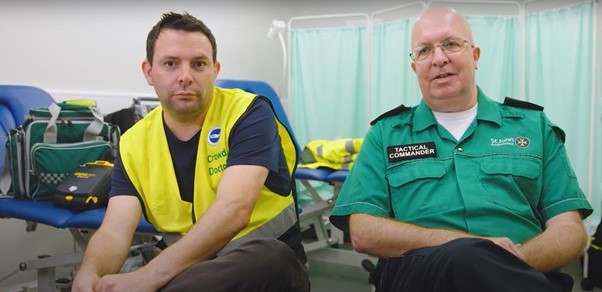Friday 21 October, 2022: A Nottingham Forest supporter, who went into cardiac arrest shortly after kick-off at a football match at the Amex Stadium in Brighton and Hove, has thanked the St John volunteers, stewards and medical staff who helped save his life.
Bob Whetton, 73, suffered a cardiac arrest outside the stadium, at a Brighton match against Nottingham Forest last Tuesday (18).
He said: “I’m so grateful for the intervention of Brighton and everyone who helped, from club stewards, St John Ambulance, the paramedics, the crowd doctor, the NHS from the Royal Sussex County Hospital A&E and cardiology teams.
“I’m still under the care of the cardiology team, but if I hadn’t had that support, I wouldn’t be here to give this story.”
Just after kick-off, Bob fell as he was making his way from the train station to the away end.
St John Ambulance volunteers Peter Bennett, Declan Dexter and Cadet Myles Donald noticed he was unwell and reacted immediately with stewards and paramedics. In just over 90 seconds, they were performing CPR and had fitted a defibrillator to his chest, helping to save Bob’s life.
Thanks to an incredibly quick response from all those involved and the A&E and cardiology teams at the Royal Sussex, he is set to make a full recovery.
He is the seventh supporter in the last decade to have his life saved by the incredible work of the club's staff and St John.
Albion’s head of safety and security Adrian Morris said, “I am so proud of the staff and our medical partners. There is no doubt that their swift actions and instinctive response saved Bob's life.
"It was a textbook example of everyone involved in the health and safety of supporters at the Amex working together in an emergency situation."
Just after kick-off, Bob fell as he made his way from the station to the away end.


